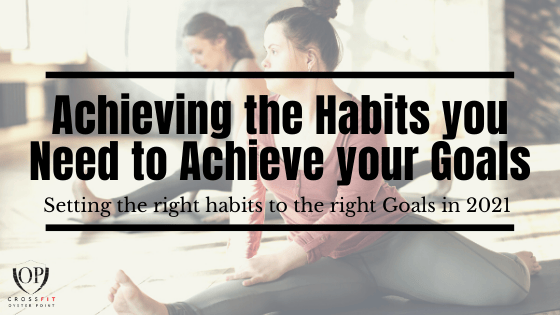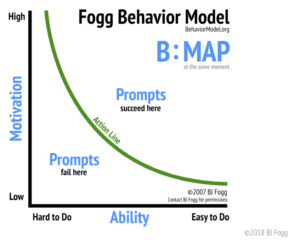It’s the start of the New Year, if you haven’t written down at least one goal you aim to accomplish this year, you’re missing out! Mindful goal setting and actively writing the goal down sets you up for a much greater chance at success than simply thinking about a goal.
Once you write down that goal, what’s next? Now what do you do to actually accomplish that New Years Resolution?
I recently listened to a Podcast featuring BJ Fogg, behaviour scientist, director of the Stanford Behavior Design Lab and bestselling author of “Tiny Habits: The Small Changes That Change Everything”. His method and his approach to creating tiny habits, and even figuring out which tiny habits to begin with, came at a perfect time for me to help you all accomplish your 2021 goals!
His “Fogg Behavior Model” states that a Behavior will happen when Motivation, Ability and Prompt come together at the same time. I’ll explain those;
Prompt:
The “thing” that triggers the habit. This can be an action, an emotion, a time, anything that lets you know (whether you’re aware or not) that it’s time to do (x). An example of this that most can relate to…coach says “okay we’re starting in 1 minute” and it prompts your habit of using the restroom. While it feels like physical need, it’s actually more a habit than a necessity in that moment.
Ability vs Motivation:
BJ discusses the teamwork between ability and motivation when it comes to maintaining/creating habits. The chances of completing a task depends on both aspects and how they work together. If your motivation is low, the ability needs to also be low. Whatever task you’re about to do is only going to get completed if it’s really easy because your motivation is really low. Like, brushing your teeth every morning…we likely don’t have much motivation to do anything first thing in the morning, but we can stick to our teeth-brushing habit because the required ability is very low. Inversely, if we have really high motivation we can take on something much more challenging, like a CrossFit class for example!
Understanding this concept can help you overcome low-motivation days…
If you struggle with motivation to workout, lower your expectations and “requirements” of what you aim to do for that workout. Remove the idea that you have to workout for 1 full hour and sweat profusely and do RX weight otherwise it’s not even worth it. That high ability action is going to require a lot of motivation to complete. If you’re not feeling that motivation, you’ll probably end up skipping the workout and doing nothing at all.
However, if you instead approached the situation with low ability to get started you’ll get much closer to what you actually want to accomplish. When motivation is low, tell yourself to just get your shoes on and go for a walk. It’s super “low ability” so your low motivation won’t inhibit your action. Chances are, your motivation will increase after you do this action because you’ll start to feel good and feel more accomplished already. Feelings of accomplishment are a huge part of establishing habits. Simply feeling good about yourself tells your brain to ingrain that action more permanently. You can then continue to increase your the ability of your actions along with your new motivation and new feelings of self-worth.
 Finding the Right Habit:
Finding the Right Habit:
Sometimes, we accidentally frame our end-goal in terms of habits to stick to. What I mean is, if you decide “I’m going to meditate for 10 minutes every day”, you’re only picking a habit, not necessarily a goal. I’ve discussed this similar concept in “Say Your Goals Backwards”. Framing specific behaviors and actions to accomplish your goal is great, don’t get me wrong, it’s definitely an important piece of the process. But it’s also important to figure out why you want to establish those habits in order to figure out if they are really the right habits for you!
Figuring out why you want to do what you set out to do can help you actually find the right thing to do!
Are you tracking?! 😁 Back to our example: if you decide you want to meditate more, your goal is probably “I want to reduce my stress levels and feel more relaxed”. Now that you’ve got that decided, maybe you can find the best habit for you to accomplish that! If you find yourself failing at the daily meditations, but do find that you actually feel relaxed on the days you find the time to take your dog for a lunchtime stroll, then maybe you’re focusing on the wrong habit! You’re not failing at your goal, because ultimately meditation wasn’t ever the actual goal, relaxation was! So now that you’ve found the right habits for your goal, you can be successful!
Plus, bonus tips:
I’ll save the full details for another blog post maybe one day, but here’s the three steps BJ shared about ending bad habits. (Also, he said he hates the term “breaking” habits because it implies you can just exert one strong force and be finished with it. Instead, he prefers “untangling” a habit because it will take sustained effort and small actions to remove that habit!)
How to “untangle” a Bad Habit:
- Create a bunch of good, new habits
– feeling accomplished helps you feel like the “type of person” who does do xyz and doesn’t do zyx - Design to stop the unwanted behavior
– remove the prompt (if you have a bad habit of nighttime snacking, but you only reach for the snacks when you sit on the couch to watch Netflix, instead sit on the floor and do some stretches while you watch so you avoid that prompt of stagnant couch-sitting).
– make the ability to start higher (same example, removing the snacks from your house makes the ability much higher, you’d have to leave your house to go fetch the bad snacks instead of just grabbing them from your pantry.)
– or remove the motivation (same example, going deeper, you can search within yourself why you feel the need to snack and what keeps you doing it even when you don’t actually feel like you want to.) - Swap/Replace the habit
– when all the above hasn’t worked, substituting can be an alternative. (instead of snacking on chips, find a healthier substitute that still satisfies your need for something crunchy while you watch Netflix.)




 Finding the Right Habit:
Finding the Right Habit: